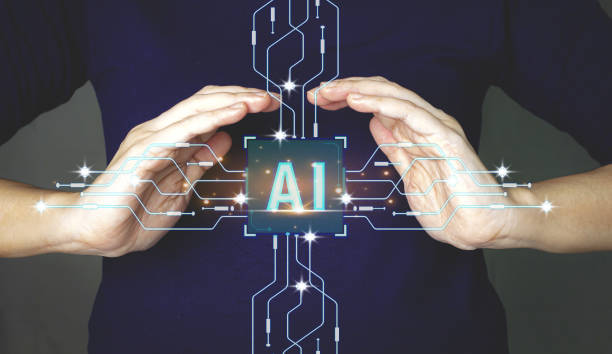Artificial Intelligence in Your Hands: What is a Mobile AI Application?

The world of #Artificial_Intelligence (AI) is rapidly advancing, and one of its most significant manifestations is the prominent presence of mobile AI applications in our daily lives.
A mobile AI application is not simply an application; rather, it is a collection of complex algorithms and models that enable your device to perform tasks that were previously exclusive to humans.
These tasks can include voice recognition, language translation, face recognition, answering questions, suggesting products and services, and much more.
In fact, artificial intelligence empowers applications to be smarter, more adaptable, and more useful.
By leveraging cloud processing and the computational power of mobile devices, mobile AI applications provide users with new experiences.
For example, a mobile AI application can analyze your behavior and interests to deliver personalized content, save you time and money, and even help you make important life decisions.
Today, mobile AI applications are used in various fields such as education, healthcare, entertainment, commerce, and security, playing an important role in improving the quality of life for individuals.
But the question is, how can we best utilize this powerful technology? In this guide, we will comprehensively examine mobile AI applications, their various uses, advantages and disadvantages, and how to choose and use them correctly.
Do you have an online store but your sales are not as expected? Rasaweb solves your problem forever with professional online store design!
✅ Significant increase in conversion rates and sales
✅ Exceptional user experience for your customers
⚡ Click to get a free consultation with Rasaweb!
Types of Mobile AI Applications and Their Uses
![]()
Mobile AI applications fall into different categories, each with its own specific uses.
Some of the most important types of these applications include:
- Voice Assistants: These applications, using Natural Language Processing (NLP), allow users to interact with their device using voice.
Siri, Alexa, and Google Assistant are among the most popular voice assistants. - Language Translation Applications: These applications, using machine translation, allow users to translate texts and speech into different languages.
Google Translate is one of the best language translation applications. - Image Recognition Applications: These applications, using computer vision, allow users to recognize objects, faces, and scenes in images.
Google Lens is an example of this type of application. - Recommender Applications: These applications, by analyzing user behavior and interests, recommend related products, services, and content.
Movie recommendations on Netflix and product recommendations on Amazon are examples of this type of application. - Health and Wellness Applications: These applications, using artificial intelligence, help users manage their health.
These applications can diagnose symptoms of diseases, suggest appropriate diets, and help improve sleep.
Mobile AI applications also have many uses in other fields such as education, entertainment, commerce, and security.
For example, educational applications can help students learn better, entertainment applications can provide more engaging experiences, business applications can help improve business productivity, and security applications can protect users’ personal information.
Advantages and Disadvantages of Using Mobile AI Applications

Using mobile AI applications has many advantages, but it also has disadvantages.
Some of the most important advantages of using these applications include:
- Increased Productivity: Mobile AI applications can help users increase productivity by automating repetitive and time-consuming tasks.
- Improved Accuracy: Mobile AI applications can help users make better and more accurate decisions by analyzing data accurately.
- Personalized Experiences: Mobile AI applications can provide personalized experiences by analyzing user behavior and interests.
- Easy Access: Mobile AI applications are easily accessible to users and can be used anytime, anywhere.
In contrast, some of the disadvantages of using mobile AI applications include:
- Privacy Concerns: Mobile AI applications need to collect and process users’ personal information to provide their services, which can raise privacy concerns.
- Dependence on Data: The performance of mobile AI applications depends on the quality and quantity of their training data.
If the training data is incomplete or incorrect, the application’s performance will also be affected. - Cost: Some advanced mobile AI applications are expensive and may not be accessible to all users.
- Possible Errors: Mobile AI applications may make mistakes in some cases and provide incorrect results.
By considering the advantages and disadvantages of using mobile AI applications, users can decide whether using this technology is right for them.
| Advantages | Disadvantages |
|---|---|
| Increased Productivity | Privacy Concerns |
| Improved Accuracy | Dependence on Data |
| Personalized Experiences | Cost |
| Easy Access | Possible Errors |
How to Choose a Suitable Mobile AI Application?

Choosing a suitable mobile AI application can have a significant impact on your user experience.
To choose correctly, consider the following:
- Identify Your Needs: First, you need to specify what you expect from a mobile AI application.
What tasks do you want it to perform? What problems do you want it to solve? - Do Your Research: Before installing any application, do some research about it.
Read reviews from other users, check the application’s rating, and make sure the application is reputable and trustworthy. - Pay Attention to Privacy: Before installing a mobile AI application, carefully read its privacy policy.
Make sure the application protects your personal information properly. - Try the Free Version: Many mobile AI applications have a free version.
Before purchasing the paid version, try the free version and make sure the application meets your needs. - Install Updates: Mobile AI application developers regularly release updates to fix bugs and improve application performance.
Make sure you always have the latest version of the application installed.
By following these tips, you can choose a suitable mobile AI application and benefit from its advantages.
Does your company website perform as befits your brand? In today’s competitive world, your website is your most important online tool. Rasaweb, a specialist in professional corporate website design, helps you to:
✅ Attract customer trust and credibility
✅ Convert website visitors into customers
⚡ Get a free consultation!
Important Tips for Safe Use of Mobile AI Applications
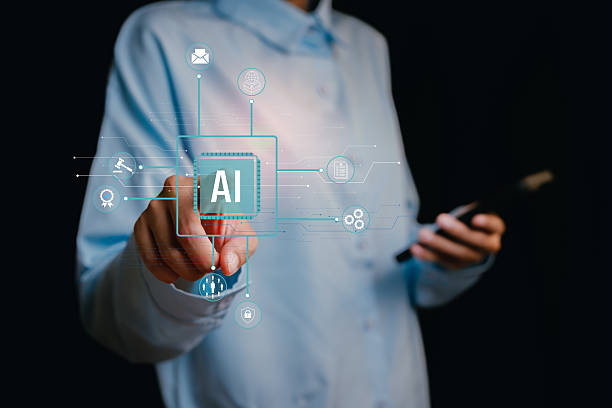
Safe use of mobile AI applications is of utmost importance.
To prevent potential misuse, you should observe the following:
- Choose a Strong Password: Use a strong and unique password for your user accounts in mobile AI applications.
Avoid using the same password for different accounts. - Enable Two-Factor Authentication: Two-factor authentication adds an extra layer of security to your user account.
By enabling this feature, even if your password is leaked, hackers cannot access your account. - Pay Attention to Application Permissions: Before installing any application, pay attention to the permissions it asks for.
If an application requests permissions that are not related to its functionality, avoid installing it. - Do Not Share Your Personal Information: Avoid sharing your personal information with mobile AI applications.
Especially information such as phone number, email address, and credit card information. - Pay Attention to Security Alerts: If the mobile AI application displays security alerts, pay attention to them and take the necessary actions.
By following these tips, you can protect your personal information from potential misuse and use mobile AI applications safely.
What Will Be the Future of Mobile AI Applications?

The future of mobile AI applications is very bright and promising.
With the advancement of technology, mobile AI applications are expected to become smarter, more powerful, and more practical.
In the future, mobile AI applications will be able to perform more complex tasks, make better decisions, and provide more personalized experiences.
For example, mobile AI applications can help people in areas such as disease diagnosis, self-driving, personalized education, and financial management.
Mobile AI applications are also expected to integrate with other devices and systems to create a smart ecosystem.
For example, mobile AI applications can communicate with smart homes, smart cars, and wearable devices, making people’s daily lives easier.
However, there are also challenges in the development path of mobile AI applications.
One of the most important challenges is protecting users’ privacy.
By collecting and processing large amounts of data, mobile AI applications must ensure that users’ personal information is properly protected.
Overall, the future of mobile AI applications is very exciting, and this technology is expected to play an important role in people’s daily lives.
Using mobile AI applications is no longer an option, but a necessity.
Mobile AI Applications and Their Impact on Businesses
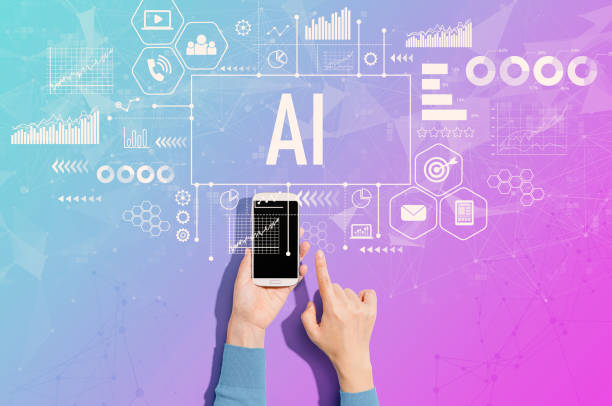
Mobile AI applications have a significant impact on businesses and can help improve productivity, reduce costs, and increase revenue.
Some of the most important uses of mobile AI applications in businesses include:
- Customer Service: Mobile AI applications can be used to provide better and faster customer service.
Chatbots, using Natural Language Processing, can answer customers’ questions, solve their problems, and provide the necessary guidance. - Marketing: Mobile AI applications can be used to personalize marketing and advertising.
By analyzing customer behavior and interests, more targeted advertising can be delivered and conversion rates can be increased. - Sales: Mobile AI applications can be used to forecast sales, identify potential customers, and improve the sales process.
By analyzing sales data, patterns and trends can be identified that help improve sales performance. - Human Resources Management: Mobile AI applications can be used for hiring, training, and managing employees.
Using artificial intelligence, the hiring process can be made faster and more efficient, personalized training programs can be provided, and employee performance can be improved. - Data Analysis: Mobile AI applications can be used to analyze large amounts of data.
| Area | Mobile AI Application Use |
|---|---|
| Customer Service | Chatbots to answer questions and solve problems |
| Marketing | Personalizing advertising and increasing conversion rates |
| Sales | Forecasting sales and identifying potential customers |
| Human Resources Management | Hiring and training employees |
| Data Analysis | Analyzing large amounts of data for better decision-making |
Ethical Considerations in the Development and Use of Mobile AI Applications
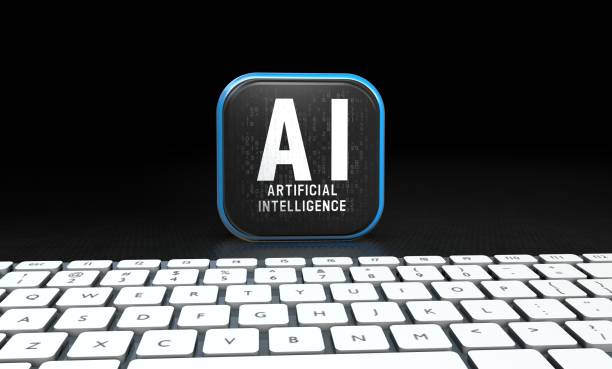
The development and use of mobile AI applications bring important ethical considerations.
One of the most important of these considerations is protecting users’ privacy.
Mobile AI applications need to collect and process users’ personal information to provide their services.
This information can include location information, contact information, search information, and financial information.
Therefore, mobile AI application developers must ensure that users’ personal information is properly protected and not misused.
Another important issue is discrimination.
AI algorithms operate based on their training data.
If the training data is incomplete or biased, the algorithms may also exhibit discriminatory behavior.
Therefore, mobile AI application developers must ensure that their algorithms are fair and impartial.
Accountability is also an important ethical consideration.
If a mobile AI application causes damage, who will be responsible? The application developer? The user? Or the algorithm itself? These questions do not have simple answers and require careful consideration.
Transparency is also of great importance.
Users should know how a mobile AI application works and how their information is used.
Mobile AI application developers should try to make their algorithms as transparent and understandable as possible.
In summary, the development and use of mobile AI applications must be carried out with ethical considerations in mind to prevent potential misuse and ensure that the interests of all members of society are met.
In this case, mobile AI applications will become a useful and efficient tool.
Did you know that a poorly designed online store can drive away up to 70% of your potential customers? Resaweb transforms your sales with professional and user-friendly online store design.
✅ Significant increase in sales and revenue
✅ Full optimization for search engines and mobile
⚡ [Get a free consultation from Resaweb]
Introducing Some Popular and Practical Mobile AI Applications

Currently, there are many mobile AI applications available, each with its own specific uses.
In this section, we introduce some popular and practical mobile AI applications:
- Google Assistant: A smart voice assistant that allows users to interact with their device using voice.
Google Assistant can answer questions, set reminders, play music, make calls, and do many other things. - Google Translate: A language translation application that allows users to translate texts and speech into different languages.
Google Translate uses Neural Machine Translation (NMT), which has significantly improved the accuracy and quality of translations. - Google Lens: An image recognition application that allows users to recognize objects, faces, and scenes in images.
Google Lens can provide information about objects, translate texts, and even solve math problems. - Microsoft Pix: A smart camera application that uses artificial intelligence to capture better images.
Microsoft Pix automatically adjusts camera settings, selects the best moments, and reduces image noise. - Replika: A smart chatbot application that allows users to converse with an artificial intelligence.
Replika can act as a friend, advisor, or even a therapist.
Overall, mobile AI applications are transforming our lives.
Challenges and Opportunities Facing Mobile AI Application Developers
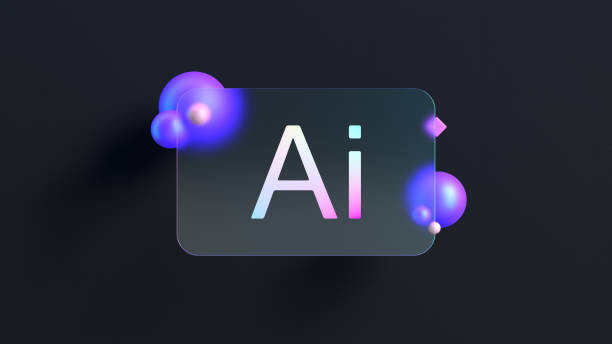
Developing mobile AI applications comes with numerous challenges and opportunities.
One of the most important challenges is the lack of quality training data.
AI algorithms need large amounts of training data to learn and function correctly.
If the training data is incomplete, incorrect, or biased, the performance of the algorithms will also be affected.
Another challenge is the hardware limitations of mobile devices.
Mobile AI applications require high computing power to process data.
While mobile devices have limited resources.
Therefore, mobile AI application developers must design their algorithms in a way that delivers the best performance with minimal resources.
Protecting users’ privacy is also an important challenge.
Mobile AI applications need to collect and process users’ personal information to provide their services.
Therefore, mobile AI application developers must ensure that users’ personal information is properly protected and not misused.
However, there are also many opportunities for mobile AI application developers.
Demand for mobile AI applications is increasing, and there is a growing market for this technology.
Mobile AI applications can play an important role in improving the lives of individuals and businesses.
Using mobile AI applications, various problems can be solved, processes can be improved, and new experiences can be provided.
Mobile AI applications are the future of technology, and developers can achieve great success by investing in this area.
Undoubtedly, mobile AI applications will shape the future of technology.
These programs, in a way, are mobile AI applications that help us with our daily tasks.
Frequently Asked Questions
| Question | Answer |
|---|---|
| What is a mobile AI application? | It is software that uses artificial intelligence technologies (such as machine learning, natural language processing, computer vision) on a mobile device to perform tasks, personalize the user experience, or automate processes. |
| Name a few examples of these applications? | Voice assistants (such as Siri, Google Assistant), facial recognition programs, smart keyboards, photo editors with AI capabilities, and translation applications. |
| What are the benefits of mobile AI applications? | Enhancing the user experience, personalizing services, automating tasks, improving accessibility, and providing offline capabilities for some AI features. |
| What are the challenges of developing these applications? | Limitations of processing power and battery life of mobile devices, data privacy concerns, optimizing the size of AI models, and the need for continuous updates. |
| How do these applications process data (on device or in the cloud)? | Some process locally (on the device) for speed and privacy, others send data to the cloud for processing, and often a hybrid approach is used. |
| What technologies are commonly used in them? | Machine learning (ML), deep learning (DL), natural language processing (NLP), computer vision (CV), and speech recognition. |
| What impact do they have on daily life? | Simplifying tasks, improving communications, increasing entertainment, providing personalized recommendations, and helping to live smarter. |
| What is “edge AI” in the mobile context? | It refers to running AI models directly on the mobile device (at the “edge” of the network) instead of sending data to a central cloud server. |
| What is the future trend for these applications? | More powerful AI on the device, deeper integration with augmented reality (AR), hyper-personalization, and a greater emphasis on ethical AI and privacy. |
| Are mobile AI applications always online? | No, many modern applications use on-device AI for core capabilities, allowing them to work offline or with limited connectivity, although some features may require the Internet. |
And other services of Rasa Web Advertising Agency in the field of advertising
Smart Marketing Automation: Professional optimization for customer acquisition using attractive user interface design.
Smart Customer Journey Map: A creative platform for improving online growth by optimizing key pages.
Smart Custom Software: Transform online growth by helping to optimize key pages.
Smart Marketplace: A combination of creativity and technology for campaign management through marketing automation.
Smart Marketplace: Designed for businesses looking for digital branding through intelligent data analysis.
And more than hundreds of other services in the field of internet advertising, advertising consulting, and organizational solutions
Internet Advertising | Advertising Strategy | Advertorial Reports
Resources
Google AI Assistant Gemini Arrives on Android and iOS
,Unveiling the Application of Artificial Intelligence in Everyday Life
,List of Useful Mobile AI Applications for Doing Homework
,

